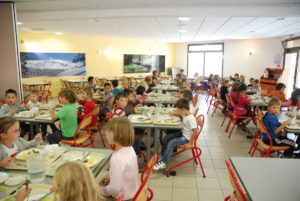Lunch time: waste of time?
I came across a surprising article titled “Students are more likely to eat at school when given extra time, new study finds”. This study surprised me because what is presented as a scientific and scientifically measured finding is obvious to me. No doubt that I am guided by my French culture, but it seems obvious to me that to eat properly, and to benefit from it, everyone should preferably sit down and spend time. In France it is culturally accepted that adults should eat 3 times a day (breakfast, lunch and dinner), preferably at fixed times (breakfast between 6am and 9am for a workday, lunch around noon and dinner around 8pm or 9pm). We eat seated at the table, with family or friends or with colleagues (depending on where we are) and we spend at least 45 minutes for lunch and dinner, a little less (30 minutes?) for breakfast. Kids have one more meal, a snack, generally around 4pm. All these “rules” that we consider to be obvious seem totally ignored in the USA.
The first point is the length of a meal. I believe that in the United States eating is basically considered as a waste of time. So, people make it “profitable” by doing something else: meeting, driving, walking from one point to the other, making a phone call, whatever. They don’t want to “waste” their time eating.
The consequence of this behavior is that people eat all the time and at any time. Either because the brain doesn’t have enough time to realize that they have eaten (so they are hungry all the time) or because they do their food intake (at this level I don’t call this eating) whenever they can.
As I mentioned in a previous article, before living in the US, I was amazed to see Americans eat everywhere: while driving, walking or even while talking to you. I used to think “are they in such a hurry to eat? Or do they lack self-control, like “I’m hungry so I instantly need to eat, no matter the time and place?”” But in fact, it’s a vicious circle: people eat whenever they can so perhaps the individual I saw eating a sandwich at 10am was eating his lunch ahead of time or he was eating his breakfast late. But in addition to eating anywhere, anytime, people end up lacking self-control (besides why would they wait for a specific time to eat? There is no culturally set time for eating!) Everyday life eating is more filling the stomach than a social and cultural act.
So, at the elementary school the time set for lunch is reduced to the minimum portion. Generally, students have a total of 30 minutes for lunch, which means the time actually spent at the table is barely 20 minutes. In fact, if we consider that it takes them 5 minutes each way (getting out of their classroom, lining up, walking to the cafeteria, being seated, taking out their lunch, then in the other direction packing their lunch- box, getting out of the table and lining up, heading to the playground for the recess), they have less than 20 minutes left to eat. It’s too short. I have been to my children’s school cafeteria for several times to have lunch with them (as we are allowed to) and each time I saw that most kids spend their time talking and nibbling a little bit. Not to mention that lunch boxes and cafeteria trays are made of cold food, sandwiches, mini pizza etc. with some carrots or nearly warm broccolis. There are no hot 3-courses French style first course -entree -dessert meals, and it doesn’t to encourage children to eat.
In middle and high school, it’s even worse. They have 25 to 20 minutes for lunch. As eating is considered as a waste of time, the schedule minimizes it. If we take off the 10 minutes students spend to actually sit down at the table they have roughly 15 or even 10 minutes to eat! We can’t decently call this eating, it’s more of swallowing or binging the food! Repeated daily, the effects of this behavior can only be harmful.
The meal time also seems very flexible. As eating is considered as accessory, people eat at any time. Of course, dinner time is earlier in the US than in France. I know that traditionally dinner is between 6 and 6:30 pm while in France it is rather 7 or 7:30 pm for children and 8 or 9 pm for adults (and somewhere in between if children and adults eat together). But what particularly surprises me is the time for lunch. Even at school lunch can happen at times that I consider far-fetched.
At school for example according to the size of the cafeteria and the lunch service requirements, students can eat daily at 10:45 am or 1 pm. When we were in Baltimore 4 years ago, one of my sons was in first grade. They lunched every day from 10:45 to 11:15! How can anybody have lunch at 10:45? Likewise, another of my sons was in first grade here in Blacksburg and the lunch time was eating from 12:50 pm to 1:20 pm. I think for those little kids it was very late! In France little ones are served lunch first.
And in case of early dismissal, lunch is also anticipated. In my son’s middle school those days they “have lunch” at 10am! Now for those days I give him only a snack because otherwise he will have lunch at home only at 1 pm and without a snack he will be very hungry.
Even the location of the cafeteria surprises me. Often there is no dedicated room: tables are set and put away every day in the gymnasium.
The number of meals and snacks is also surprising: both adults and children snack several times a day. Parents are asked to provide a snack for their child in the for the morning break, which is not done in France. I remember a few years ago, when my oldest son was in Pre-K in France, the school provided them with a fruit and milk at 10 am. But this was removed the following year because according to a European study I think, eating even healthy things at 10 am, could contribute to kids obesity. And honestly my kids never asked me in France to put a snack in their backpack for 10 am or give them a snack in the morning during the holidays, once they have had breakfast. So why this craze for snacks in the US (and especially at school)? I think Americans think that as soon as a child performs a physical or intellectual activity, he needs to be it must “recharged” by eating some food. And I think it’s useless. In France when my children had their soccer practice at 2 pm during weekends, they didn’t snack immediately after. They had their afternoon snack at 4 pm!
Not sitting down at the table with others to have lunch or dinner is another issue. Having lunch (not a meeting!) with colleagues is something we miss here as a time for exchange and sharing. What people consider in the US as a waste of time is a real moment of conviviality and sometimes let to solve small problems or misunderstandings or even becomes sometimes (but not systematically) mini meetings. As for family meals (during evenings or weekends), I know that even in France not every family respects the ritual of dining at the table with the family. But it seems that in the United States it is a real problem to make it a cultural habit.
It seems that the number of overweight and obese adults and children in the United States is alarmingly high. According to the Center for Disease Control and Prevention (2013-2014 numbers):
- 70.7% of adults aged 20 and over were overweight or obese, (including 37.9% of adults aged 20 and over were obese),
- 20.6% of adolescents aged 12-19 years were obese,
- 17.4% of children aged 6-11 years were obese,
- 9.4% of children aged 2-5 years were obese,
While in France in 2015 49% of adults were overweight, 16.9% of 6-17-year-old kids were overweight and 3.9% kids were obese.
It is commonly accepted that French public health campaigns such as “eat, move” and “5 fruits and vegetables a day” have helped to contain overweight and obesity in France. But I think that the aforementioned issues (the number, time and duration of meals) are also important factors.
It is often said that children do not have enough time to eat at school and we jealous the system of other countries like France. It seems to me that in this as in everything, children follow the example of parents and adults. Since adults consider the time to eat as a high school and to shorten as much as possible, children do the same (and anyway, school, so adults force them to do the same). I can only hope that someday mentalities evolve in the United States and that we no longer consider eating as the action of filling the stomach but as an important part of everyday life.



